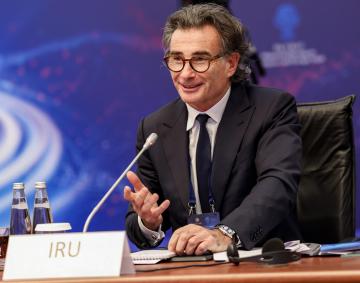The Economic Cooperation Organization (ECO) region is a leading user of the TIR system, with three of its members – Uzbekistan, Iran and Türkiye – being the top carnet issuers globally. IRU outlined key measures to ministers to further ease trade bottlenecks in the region at a high-level ECO meeting in Istanbul this week.
The 5th Economic Cooperation Organization (ECO) ministerial meeting on commerce and foreign trade took place in Istanbul, Türkiye, this week. It was the first ECO meeting of trade ministers in 14 years.
IRU welcomed the approval of the ECO Trade Facilitation Strategy as a comprehensive, practical roadmap designed to simplify border procedures, ensure public-private partnerships, harmonise transit regimes, and expand the use of digital tools.

Addressing the trade ministers, IRU Secretary General Umberto de Pretto said, “The ECO Trade Facilitation Strategy’s focus on digitalisation, coordinated border management and risk-based controls aligns closely with IRU’s longstanding efforts to help ECO countries improve cross-border efficiency and lower transport costs.”
IRU also stressed the importance of the ECO Trade Agreement Strategy, designed to simplify, harmonise and modernise trade and transit procedures across the ECO region, highlighting that proper implementation of TIR can already achieve many of its objectives.
“Unnecessary restrictions and repetitive controls at borders continue to impose significant economic costs on ECO countries,” said Umberto de Pretto. “The full implementation of digital internationally recognised tools, such as eTIR and e-CMR, is needed to accelerate transit and strengthen supply-chain resilience.”
As part of this effort, TIR-EPD Green Lanes should be implemented at border crossings to effectively distinguish low-risk TIR trucks from high-risk cargo. This measure sharply reduces waiting times and significantly enhances border efficiency and capacity.
“TIR Green Lanes have proven to be one of the most effective tools for boosting border efficiency,” said Umberto de Pretto. “Risk-based prioritisation should also be incorporated into increasingly common digital truck queuing systems.”
“If every ECO country supports digital transit, modern, secure and fast border crossing procedures via better risk analysis and harmonised standards will follow. IRU stands with each ECO member state to make this a reality,” concluded Umberto de Pretto.
On the sidelines of the event, Umberto de Pretto held bilateral meetings with Iran’s Minister of Industry, Mines and Trade, Seyyed Mohammad Atabek, and Pakistan’s Federal Minister for Communications, Abdul Aleem Khan, on practical steps to raise the efficiency and security of trade corridors across the ECO region.
IRU remains committed, including through the new ECO–IRU Action Plan for 2026–2027, to working closely with ECO, its member states, and private-sector partners to turn the region into a seamless, modern and competitive trade hub powered by efficient and secure road transport.
